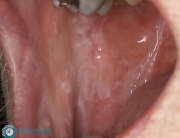What causes mouth soreness?
There are many conditions that can cause the mouth to be sore. Infections, mouth ulcers, diabetes and being deficient in some vitamins and minerals can all cause burning sensations in the mouth. These conditions cause signs that can be identified by a specialist in the mouth, with x-rays or on blood tests. Treatments such as antibiotics and anti-fungals medicines should not be used unless an underlying infection has been carefully identified.
In oral dysaesthesia or burning mouth syndrome, the causes listed above have been ruled out. There are no signs of disease or infection inside the mouth. We do not know the precise cause of oral dysaesthesia or burning mouth syndrome. There have been associations with hormonal changes, psychological distress and changes in mood but these are not considered to be causes of altered sensation in the mouth. We do know that when a burning or painful sensation persists in the mouth, changes occur in the nerves of the mouth as well as in the pain processing areas of the brain. The nerves of the mouth can send faulty signals, which the pain centres of the brain find difficult to interpret. This results in uncomfortable sensations in the mouth even though there is no obvious cause for them. Anxiety, stress and even being concerned about the discomfort are common and these can make the sensation worse, resulting in a vicious circle.
Is it common?
Oral dysaethesia and Burning mouth syndrome are relatively common, affecting roughly one percent of the population. They affect women more often than men, and tend to affect people in their forties, fifties and sixties more than other age groups.
What does it feel like?
The sensations experienced in burning mouth syndrome and oral dysaesthesia vary from person to person and may affect any part of the mouth. Often the mouth feels uncomfortable or different rather than painful. Feelings of burning are common but do not have to be present. The sensations of soreness, dryness and altered taste are common. Sometimes it may feel as though the mouth or breath smell different as well.
What can make it better?
The treatments available for burning mouth are aimed at trying to make the mouth feel more comfortable. Many people are understandably very concerned about the sensations in the mouth. Often, simply understanding what is happening and knowing that it is not dangerous makes the mouth feel more comfortable. Local anaesthetic sprays and mouthwashes can also make the mouth feel more comfortable for short periods of time. When this is not sufficient, treatment is based on psychological techniques to help to manage the discomfort and medicines to calm down the faulty nerve signals. These treatments may take time to work, but are the most effective techniques to help to make the mouth feel better.










